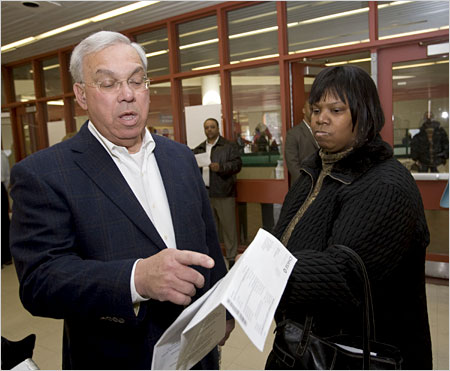| @wehaitians.com | |
No one writes to the tyrants | |
HistoryHeads/Not Just Fade Away |
| Correspond with us, including our executive editor, professor Yves A. Isidor, via electronic mail: |
| letters@wehaitians.com; by way of a telephone: 617-852-7672. |
| Want to send this page or a link to a friend? Click on mail at the top of this window. |
|
 |
|
| Posted Sunday, March 30, 2008 |
In Boston, Residents Seek Face-to-Face Advice to Avoid Foreclosure |
 |
|
RICK FRIEDMAN FOR THE NEW YORK TIMES |
|
| Carol Anderson showed her mortgage papers to Mayor Thomas M. Menino of Boston on Saturday at a workshop organized by the city to help people restructuring loans and save their homes. | |
By KATIE ZEZIMA |
BOSTON — Carol Anderson has gone the entire winter without heat or hot water in her home here, because the payments on her adjustable rate mortgage have ballooned to $5,000 a month and she cannot afford paying a gas bill.
Desperate for help, Ms. Anderson attended a workshop on Saturday organized by Mayor Thomas M. Menino of Boston intended to help the city’s homeowners avoid foreclosure. Representatives from five mortgage companies met with clients to try to restructure loans. The workshop also offered classes on homeownership, credit ratings and other financial topics, in addition to providing residents with access to foreclosure prevention counselors.
“It’s a nightmare trying to keep our head above water,” said Ms. Anderson, who lives in the Dorchester neighborhood of Boston. “I have to pay my mortgage. It’s the first priority, above everything.”
The daylong seminar, held at a high school, was organized by the Department of Neighborhood Development, which started a Foreclosure Prevention Initiative in late 2005 as it saw the number of foreclosures steadily rising. It provides residents with counseling services and, in many cases, helps them restructure mortgages.
Foreclosures in Boston increased 169 percent from 2006 to 2007, according to city officials. Most are concentrated in Dorchester, Roxbury and Mattapan, three of the city’s poorest neighborhoods. The mortgage providers identified at-risk borrowers who lived in Boston and mailed them a letter notifying them of the workshop. About 1,500 households received the letter, which was written by the city. It is the first workshop the city has held with mortgage lenders and their customers.
“This is the only way to give peace of mind to a lot of folks who are in danger of losing their homes,” Mr. Menino said. “You don’t ever talk to real people about a mortgage. It’s press 1 for this, 2 for that.”
Sophia Mitte of Mattapan said she spent seven months trying to modify her Wells Fargo loan, only to be notified by the company that her home was in foreclosure and a sale date was planned for April. Ms. Mitte said her son had to drop out of college and join the Marines because her family was no longer able to afford his tuition payments because of their mortgage. She also pays $300 a month for experimental cancer drugs.
“I have to save my house,” said Ms. Mitte, who has owned the home for 13 years. “I have three kids, and we have nowhere else to go.”
Ms. Mitte said she met with a Wells Fargo representative Saturday, who said the company would work with her and her loan provider to reach some type of agreement that would help Ms. Mitte keep her home. “I feel relieved,” Ms. Mitte said. “I finally met with someone face-to-face.
I feel as though he was being honest with me and he really wants to help. If they showed up, they must be honest about trying to save people’s homes.”
Spokeswomen for Washington Mutual and Countrywide, two of the mortgage providers at the workshop, said the companies often participated in such seminars and worked with federal and state officials to help people keep their homes.
“Our customers are telling us that they enjoy the personalized touch and the friendly manner that our employees bring to these difficult discussions, and we look forward to expanding our efforts in the coming months,” Lisa Friedman, a spokeswoman for Washington Mutual, wrote in an e-mail message. “We view foreclosure as a remedy of last resort and want our customers to know that our primary goal is to keep them in their homes with payments they can afford.”
Yuderka de la Cruz , from the Hyde Park neighborhood, bought her home in 2005 and refinanced a year later with two balloon mortgages. She now pays $3,400 a month, and her interest rates will increase by 3.9 percent in August.
“They didn’t explain it real well when I went in,” said Ms. De la Cruz, who hoped to restructure her financing plan. “I’m going to lose my house. I don’t want to lose my house and put my kids on the street.”
Ms. Anderson met with a representative from Urban Edge, a nonprofit community development corporation that is helping inner-city residents escape foreclosure.
Robert J. Credle, director of community programs at Urban Edge, said it planned to speak to Ms. Anderson’s lender about combining her two mortgages into one fixed rate, 30-year mortgage.
“It isn’t going to be easy,” Mr. Credle said, “but it is doable.”
Ms. Anderson said she was encouraged.
“I feel hopeful,” she said. “I’m hoping they make it right.”
Copyright 2008 The New York Times Company. Reprinted from The New York Times, National, of Sunday, March 30, 2008.
| Wehaitians.com, the scholarly journal of democracy and human rights |
| More from wehaitians.com |